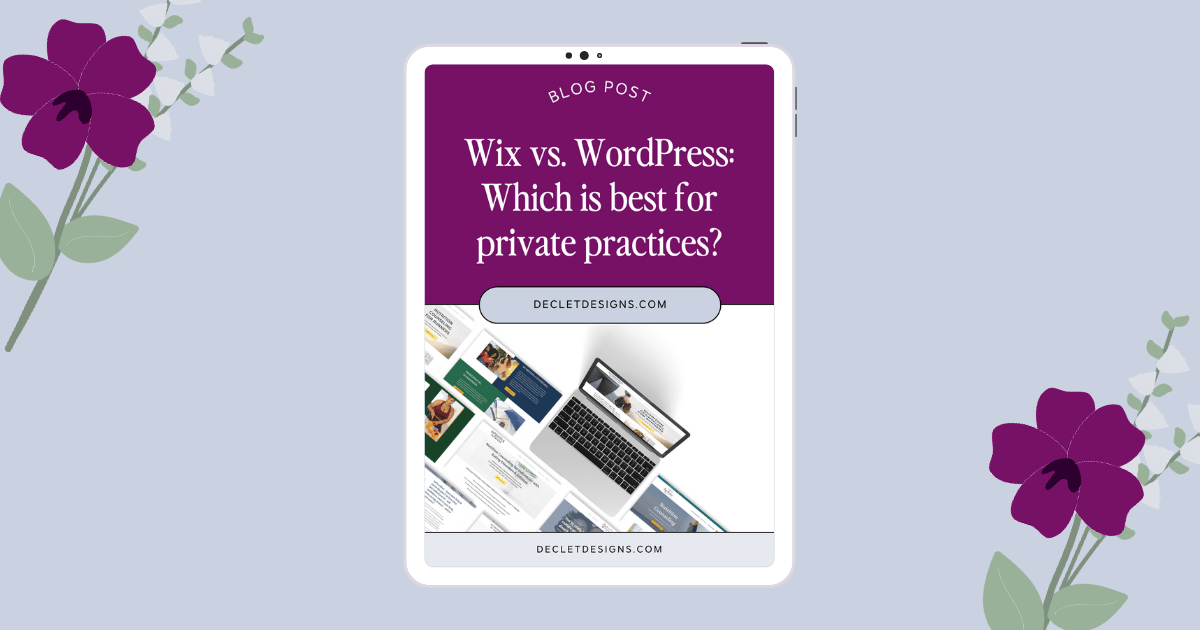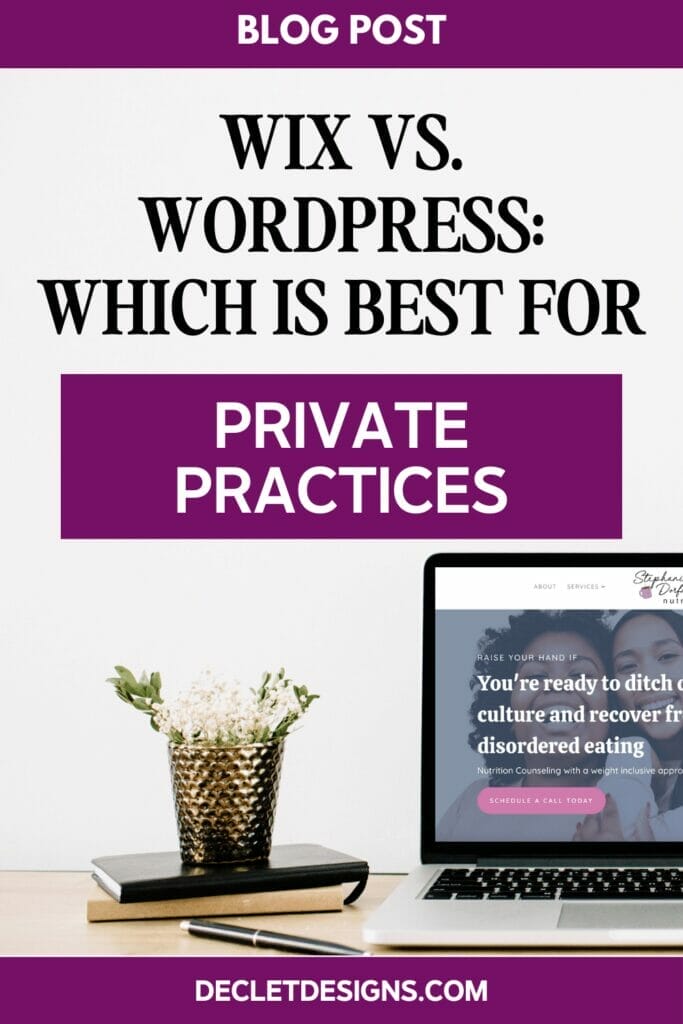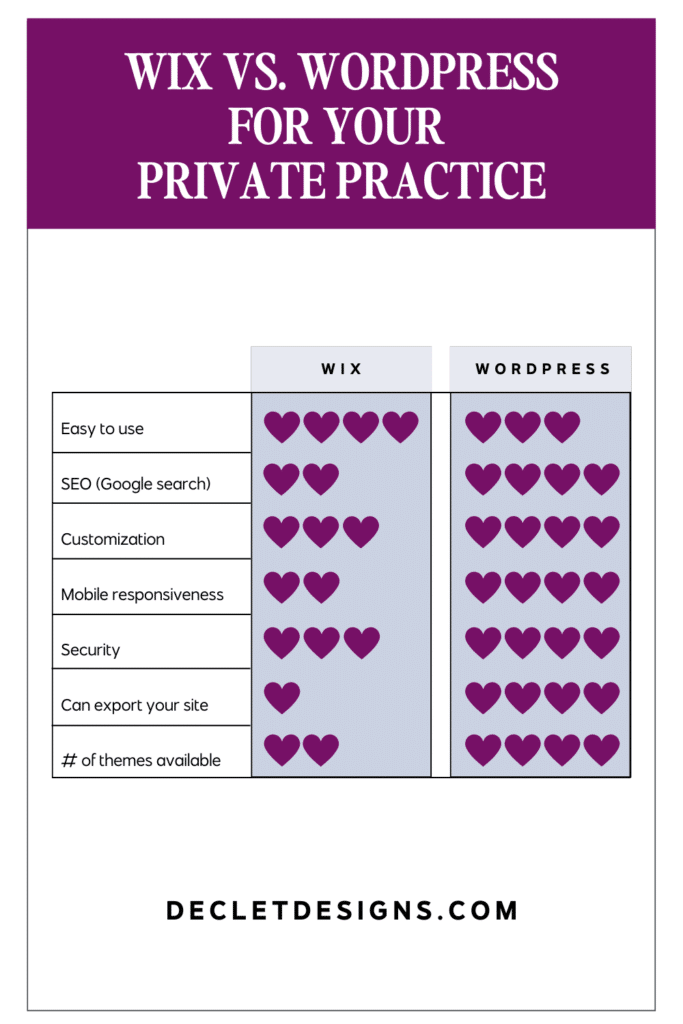

As the owner of a weight-inclusive nutrition private practice, you have a lot on your plate! You’re responsible for providing quality care to your clients, keeping up with the latest research, managing your business finances, and more. So it’s important to choose the right platform when it comes to designing your website. You may be wondering what the differences are when it comes to Wix vs. WordPress. In this blog post, we’ll take a look at the pros and cons of each platform and help you decide which is best for your private practice.

Wix and WordPress are the most popular website building platforms available today. They both offer a way to create professional websites quickly and easily. But when looking at Wix vs. WordPress and deciding which one is best for your nutrition private practice it can be a difficult decision.
Wix is a cloud-based drag-and-drop website builder and hosting platform that allows users to create rather nice looking websites without any coding knowledge. This is accomplished by simply dragging and dropping design elements into their chosen template. It offers hundreds of templates for different types of businesses, all with customizable designs that allow users to add their own branding and images.
WordPress is an open-source content management system (CMS) that powers millions of websites around the world. It’s easy to use and has an intuitive interface that makes it simple to create pages and posts as well as customize the look of your website. It also supports tons of plugins, so users can add new features like contact forms or forums anytime they want. Additionally, WordPress comes with powerful SEO options so you can optimize your site for search engine visibility while still having freedom over how it looks and what content it contains.
Let’s take a deeper look into the differences between Wix vs. WordPress so you can decide which platform is best for your nutrition private practice.
When hearing people talk about WordPress and all of its capabilities, they are talking about WordPress.ORG. I have had many clients confuse the two and when they come to me we realize that they have built a website on wordpress.com and then we have to move them over to WordPress.org. So, if you want all of the additional benefits of WordPress, make sure you choose .org.
Wix is a good option for private practice owners who are just starting. out (<1 year in business) and are looking to create a website with minimal effort and customization. Its drag-and-drop editor makes it easy to create functional websites in no time.
In addition, Wix offers a free plan with limited features that still allows you to test out the platform before committing to a paid plan. Think of this as having a digital brochure to refer people to (which is fine in the beginning, but you need a strategic website in order to grow your business further!).
The most appealing feature of Wix is its user-friendly interface. It’s rather intuitive and anyone with basic computer skills can navigate it easily. You don’t need any prior coding or design experience; all you have to do is drag and drop elements into place without having to worry about complex coding or scripting. This makes creating simple websites quick and easy.
Wix also offers a wide range of apps and templates specifically tailored toward businesses, which makes setting up your first website easier.
Finally, Wix provides 24/7 customer service support should you ever run into any issues while building or managing your website. They also offer free webinars, tutorials, and helpful blog posts full of tips and best practices for running an online business so you can stay up-to-date on the latest trends in web design and development too!
For private practice owners who are looking for a website platform that will help their business stand out, using WordPress with Divi is an excellent choice. Not only does the platform offer a wealth of features and flexibility, but it is also extremely user-friendly. With WordPress and Divi, you can create an attractive, customized, and fully functional website without having to understand any coding. The Divi theme is one of the most popular choices for creating beautiful websites and blogs with easy customization options. WordPress has some distinct advantages that make it the preferred choice for many private practices, so let’s look into those.
WordPress with Divi allows you to easily customize your site to reflect your brand’s identity and make it look professional. You can choose from hundreds of templates available in the library, or create a custom design that matches the look and feel you have in mind. Additionally, Divi’s drag-and-drop functionality makes it very easy to rearrange layouts and organize content quickly, allowing you to focus on creating beautiful designs rather than spending time debugging code. This also means that you can add extra features such as contact forms, galleries, and more without much difficulty.
WordPress is highly customizable with thousands of plugins and themes available on the market, so you can easily create a professional-looking website that reflects your brand and meets all your needs. Plus, there are plenty of tools available to help optimize your website performance, such as caching plugins or page speed optimization services. With these features, you can make sure that visitors have an enjoyable experience when they visit your website. Additionally, since WordPress is open-source software, which means it is free to use and update as often as you need; this makes it much easier to keep up with changing trends in web design for private practices!
But, having a website that looks great isn’t enough for private practice owners — they need it to be optimized for SEO so that people can find them online. Fortunately, WordPress with Divi takes care of this for you by providing built-in search engine optimization (SEO) tools that make it easier for people to find your business when they’re searching online. This includes automatic meta tags, canonical URLs, custom post types support, and more — all of which help to make sure your site is visible on search engines like Google or Bing.
A large part of improving your SEO is blogging and providing quality content. Blogging is extremely easy on WordPress and by using a plugin like Yoast or RankMath, you can ensure that you are writing content that will possibly get your site to rank on Google. I personally use and love RankMath for my blog posts!
Check out this video on how easy it is to write a blog post in WordPress and check out my blog post:
Another great feature of WordPress is its wide range of security options. It offers advanced security measures such as two-factor authentication which requires users to verify their identity before logging in. It also provides backup capabilities so that your data remains secure even if something goes wrong with the system. Furthermore, with the ability to install SSL certificates on a WordPress site, you can ensure that all communication between your customers and your site remains confidential and secure at all times.
WordPress has one of the most robust user systems available on any platform; this allows users who access your site (such as a membership site or customers purchasing items online) to have their own profiles where they can view their own information securely and privately. This not only helps them feel more comfortable while interacting with your website, but also aids in streamlining processes such as customer service inquiries or sales transactions. All these features combined make it a great platform for private practices looking for a reliable solution for their online presence.
Finally, it’s important to note that WordPress is an extremely popular content management system (CMS) used by many websites including Fortune 500 companies like Microsoft and Apple. This user base adds to its reliability as it’s constantly updated and improved upon by other users ensuring that any bugs are quickly discovered and fixed. Furthermore, WordPress has many more themes and plugins than Wix (which typically has fewer customization options).
Not to mention the support available on WordPress forums is far more expansive than its competitors as developers of all levels have access to assistance when needed. Overall, using WordPress for your private practice website is a great choice thanks to its user-friendly features, cost efficiency, broad theme/plugin selection, and unparalleled support network.
Divi is a powerful WordPress theme* that allows users to easily and quickly create stunning websites. It features an intuitive drag-and-drop page builder and over 100 customizable pre-made layouts, making it simple to customize an appealing user interface without writing any code. Additionally, Divi also offers advanced design options like multiple column layouts, custom fonts and animations, parallax scrolling effects, split testing tools, and more.
When compared to Wix, Divi gives users greater flexibility in terms of design capabilities. With its range of customization options, you can tailor each aspect of your site’s appearance – from the layout and colors to the font size and images – so it stands out and reflects your brand identity perfectly. Additionally, Divi also comes with built-in SEO optimization tools so you can ensure that your website ranks higher in the search engine result pages (SERPs).
Overall, WordPress with Divi gives nutrition private practice owners greater control over their online presence than Wix does – allowing them to create a unique website tailored specifically to their needs. So if you’re looking for an easy-to-use platform that offers impressive customization options and SEO tools at the same time, then Divi might be the ideal choice for you!
Choosing the best platform for your website as a nutrition private practice owner can be overwhelming. But, with SO many options out there, how do you know which one is best for you? In this blog post, we have discussed two of the most popular platforms: Wix vs. WordPress. And while they both offer great website building tools, they have their own unique advantages and disadvantages.
If you are a new practice and just need something to get you started, then Wix could be a good option for you. Just know that you cannot transfer your Wix design OR your blog posts to a new platform, like WordPress. Everything will have to be re-created.
Wix is great for its ease of use and simple monthly plan options. It also boasts drag-and-drop design features which make it incredibly simple to create a visually stunning site with minimal technical expertise or coding knowledge. However, while they have plenty of templates to choose from, the customization options are somewhat limited compared to other platforms such as WordPress.
On the other hand, WordPress is considered to be more powerful than Wix because of its open source capabilities and large library of free plugins and themes. You will have much more control in terms of design freedom. You have full control over customizing your site’s look and functionality, making it ideal for those with a bit more technical know-how or who don’t mind spending extra time outsourcing. Don’t forget that you will need to pay extra hosting fees if you want to use WordPress as it doesn’t come included with their platform like Wix does. My favorite hosting provider is Flywheel*. They have great prices and great customer service!
At the end of the day, when it comes to Wix vs. WordPress, you have to choose whichever platform you choose for your nutrition private practice website will largely depend on what kind of website you’re looking for and what level of experience you have in terms of web development and design. If you’re looking for something that’s easy to set up but still looks professional then Wix may be the better option for you. On the other hand, if you want complete control over your site’s design then WordPress might be better suited for your needs.
Wix offers several different pricing plans ranging from $27 to $500 per month. The basic plan includes hosting and domain name, as well as a range of features such as 500MB storage space and 1GB bandwidth. The more expensive plans offer additional features like unlimited storage space, ecommerce tools, free logo maker and more. One of the biggest advantages of using Wix is that there is no need to pay for web hosting since this is all included in the monthly price plan.
WordPress with Divi has a slightly different pricing structure than Wix since it requires you to purchase a hosting plan (which ranges from $6-$25 per month). You then have the option to buy one or more premium themes from the Divi library OR to create custom designs and layouts within the builder itself (which is what I would recommend).
With WordPress, you also get access to thousands of plugins that provide additional functionality and customization options. However, unlike Wix, there are some additional costs associated with using WordPress like purchasing premium themes or hiring developers if needed.
Ultimately, Wix vs. WordPress depends on how much control you want over how your site looks as well as what type of features you need for your business goals. If you’re looking for an easy way to create a basic website quickly without needing lots of customization options then Wix might be the better choice for you. On the other hand, if you need something more powerful with lots of flexibility then WordPress could be a better option.

If you are currently on Wix and are getting stressed out about the prospect of the time and funds it would take to move to WordPress, first I want you to take a deep breath. Good? Okay. If you don’t currently have the cash flow or time to do that, it’s okay! Keep doing what is working for your right now and when your practice has truly outgrown the capabilities (SEO and functionality) of Wix, then you can put together a plan to move over to WordPress.
One thing to keep in mind though is how many blog posts you are writing on Wix, because remember, you can’t just download those and move them over. You will have to recreate each of them on your new WordPress platform. AND don’t stick around Wix too long because your SEO takes a hit every time you move platforms or any other major changes (but is worth it in the end!).
Also, just know that I too started my nutrition private practice website on Wix. There’s nothing wrong with that. I don’t like for people to feel that Wix is inferior or should be looked down on! It’s a great platform for starting out and for what your needs may be at that time. I just know that WordPress can help the future growth of your business and is worth the extra time (and sometimes money) to get it set up.
My nutrition private practice website now ranks #1 for a local Google search for dietitians and/or nutritionists in my area! That is from lots of work on not just the structure and strategy of my website, but also my backlink strategy (being on podcast interviews, being quoted by reporters in media outlets online, etc.). It takes time and some effort, but just think about all of the calls from your dream clients that will come rolling in once you are finally ranking on page 1!
So, which is better for private practices: Wix vs. WordPress? Both have their pros and cons, but I think it really depends on your needs. If you need a simple website that doesn’t require much customization, then Wix could be a good option for you. However, if you need more control over your website and want to be able to customize it more, and have better SEO optimization and functionality, then WordPress would be a better choice. Ultimately, the best platform for you will depend on your specific needs.
To help you get started, check out my post on how dietitians can get more clients from their website. AND you can watch my FREE MASTERCLASS which covers everything you need to know about setting up a WordPress website for your private practice.

I'm a Dietitian turned Designer who loves helping weight-inclusive private practices get more clients with designs that stay true to their values & mission.
Declet Designs offers website design, branding, and SEO for weight-inclusive small businesses. Located in Athens, GA, and serves small businesses and private practices nationally.
Declet Designs is a welcoming and inclusive space for all people regardless of their race, ethnicity, age, disability, sexual orientation, gender identity or expression, neurodivergence, or national origin.
Declet Designs is located on the lands of the Muscogee and Tsalaguwetiyi people and wishes to acknowledge them as the Traditional Custodians of this land. We also pay our respects to their Elders, past, present & emerging.
COPYRIGHT 2024 DECLET DESIGNS LLC